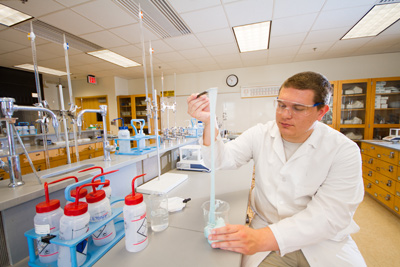
Longwood University biology major Jesse Schrader ’14 of Prospect is bringing collegiate experience and expertise to the highly competitive world of science fairs.
Schrader leads a series of weekend workshops put on by the Prince Edward County 4-H that teaches area students the scientific method through hands-on experimentation and helps them develop ideas for science fair projects. Students have constructed electromagnets, film can rockets and exploding brown paper bags, all with the goal of improving their skills so they can enter incredible displays in their fairs.
"They have improved dramatically since we started these monthly workshops in November," said Schrader. "I’ve had to make the experiments more difficult. When it comes to their science fair projects this spring, none of them will do a volcano. They are all much too advanced for that."
The difference is demonstration vs. experimentation, said Schrader. Instead of showing that chemicals will bubble up when mixed—as in the time-tested volcano project—it’s much more important to change the amounts of the chemicals to alter the outcome. Schrader encourages the eager learners to test different variables to produce different results. "We made rockets with empty film canisters, Alka-Seltzer and club soda. Two boys decided immediately they wanted their rocket to fly as high as possible, so they experimented with the chemical reaction inside and two hours later were shooting a film canister thirty feed in the air."

5 tips for creating an award-winning science fair project
1. Make sure they are having fun!
Make sure your child chooses a topic they are interested in and will enjoy. The more you are excited about the project, the better it will be.
2. Help them try something new
Beware of falling into the "volcano trap." A lot of students make a demonstration like the age-old volcano but don’t perform an actual experiment. Judges at science fairs look for students who have done good experiments where they have learned something.
3. Make sure they learn something.
The result of your child’s science fair project should be that, through experimentation, he or she learns something new. Part of the learning is the scientific method, so make sure your child identifies and tells the judges what the independent and dependent variables are, as well as what the control and hypothesis are. Judges want to know about the process of discovery as well as the final result.
4. Whatever they like—do that!
Build off your child’s free-time activities to design an experiment. Ask him or her questions about it to get the creativity flowing and find out what would make an award-winning science fair project. For example, if your child likes to play baseball, build a project around aluminum vs. wooden bats. If your child is into ballet, she could test which pointe shoe treatment works best on different surfaces.
5. Appearances matter! Make it neat and colorful.
Judges respond well to neat presentations, so make sure to help your child make her or his presentation really pop. If your child is old enough, he or she should type out the presentation and mount it on colored paper. Be sure to include photos to illustrate the steps. Remember, the more eye-catching the poster, the more likely the judges will take notice!

